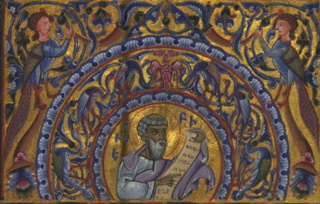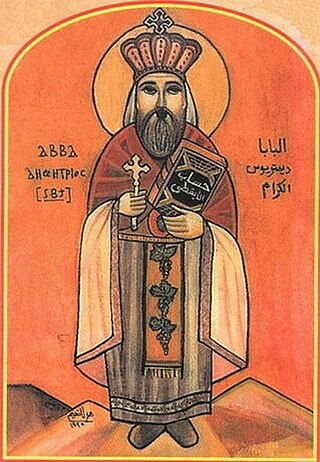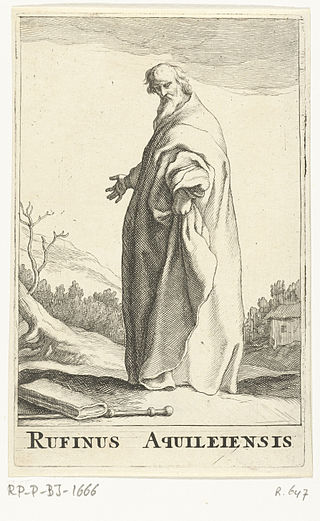
Eusebius of Caesarea, also known as Eusebius Pamphilus, was a Greek or Palestinian historian of Christianity, exegete, and Christian polemicist. In about AD 314 he became the bishop of Caesarea Maritima in the Roman province of Syria Palaestina. Together with Pamphilus, he was a scholar of the biblical canon and is regarded as one of the most learned Christians during late antiquity. He wrote Demonstrations of the Gospel, Preparations for the Gospel and On Discrepancies between the Gospels, studies of the biblical text. As "Father of Church History", he produced the Ecclesiastical History, On the Life of Pamphilus, the Chronicle and On the Martyrs. He also produced a biographical work on Constantine the Great, the first Christian Roman emperor, who was Augustus between AD 306 and AD 337.

Pope Innocent I was the bishop of Rome from 401 to his death on 12 March 417. From the beginning of his papacy, he was seen as the general arbitrator of ecclesiastical disputes in both the East and the West. He confirmed the prerogatives of the Archbishop of Thessalonica, and issued a decretal on disciplinary matters referred to him by the Bishop of Rouen. He defended the exiled John Chrysostom and consulted with the bishops of Africa concerning the Pelagian controversy, confirming the decisions of the African synods. The Catholic priest-scholar Johann Peter Kirsch, 1500 years later, described Innocent as a very energetic and highly gifted individual "...who fulfilled admirably the duties of his office".

Hippolytus of Rome was one of the most important second-third century Christian theologians, whose provenance, identity and corpus remain elusive to scholars and historians. Suggested communities include Rome, Palestine, Egypt, Anatolia and other regions of the Middle East. The best historians of literature in the ancient church, including Eusebius of Caesarea and Jerome, openly confess they cannot name where Hippolytus the biblical commentator and theologian served in leadership. They had read his works but did not possess evidence of his community. Photios I of Constantinople describes him in his Bibliotheca as a disciple of Irenaeus, who was said to be a disciple of Polycarp, and from the context of this passage it is supposed that he suggested that Hippolytus so styled himself. This assertion is doubtful. One older theory asserts he came into conflict with the popes of his time and seems to have headed a schismatic group as a rival to the bishop of Rome, thus becoming an antipope. In this view, he opposed the Roman Popes who softened the penitential system to accommodate the large number of new pagan converts. However, he was reconciled to the Church before he died as a martyr.

Epiphanius of Salamis was the bishop of Salamis, Cyprus, at the end of the 4th century. He is considered a saint and a Church Father by both the Eastern Orthodox and Catholic Churches. He gained a reputation as a strong defender of orthodoxy. He is best known for composing the Panarion, a compendium of eighty heresies, which included also pagan religions and philosophical systems. There has been much controversy over how many of the quotations attributed to him by the Byzantine Iconoclasts were actually by him. Regardless of this he was clearly strongly against some contemporary uses of images in the church.

Demetrius I, 12th Bishop and Patriarch of Alexandria. Sextus Julius Africanus, who visited Alexandria in the Bishoprice of Demetrius, places his accession as eleventh bishop from Mark in the tenth year of Roman Emperor Commodus; Eusebius of Caesarea places it in the tenth year of Septimus Severus.
Theophilus was the 23rd Pope of Alexandria and Patriarch of the Seat of Saint Mark. He became pope at a time of conflict between the newly dominant Christians and the pagan establishment in Alexandria, each of which was supported by a segment of the Alexandrian populace.
Basilides was an early Christian Gnostic religious teacher in Alexandria, Egypt who taught from 117 to 138 AD, and claimed to have inherited his teachings from the apostle Saint Matthias. He was a pupil of either the Simonian teacher Menander, or a supposed disciple of Peter named Glaucias. The Acts of the Disputation with Manes state that for a time he taught among the Persians. According to Agapius of Hierapolis he appeared in the 15th year of Trajan reign. He is believed to have written over two dozen books of commentary on the Christian Gospel entitled Exegetica, making him one of the earliest Gospel commentators.

Tyrannius Rufinus, also called Rufinus of Aquileia, was a monk, philosopher, historian, and theologian who worked to translate Greek patristic material, especially the work of Origen, into Latin.

Hexapla, also called Origenis Hexaplorum, is a critical edition of the Hebrew Bible in six versions, four of them translated into Greek, preserved only in fragments. It was an immense and complex word-for-word comparison of the original Hebrew Scriptures with the Greek Septuagint translation and with other Greek translations. The term especially and generally applies to the edition of the Old Testament compiled by the theologian and scholar Origen, sometime before AD 240.
Saint Pamphilus, was a presbyter of Caesarea and chief among the biblical scholars of his generation. He was the friend and teacher of Eusebius of Caesarea, who recorded details of his career in a three-book Vita that has been lost.
Dositheos was a Samaritan religious leader. He was the founder of a Samaritan sect often assumed to be Gnostic in nature, and is reputed to have known John the Baptist, and been either a teacher or a rival of Simon Magus.

Methodius of Olympus was an early Christian bishop, ecclesiastical author, and martyr. Today, he is honored as a saint and Church Father; the Catholic Church commemorates his feast on June 20.
Firmilian, Bishop of Caesarea Mazaca from c. 232, was a disciple of Origen. He had a contemporary reputation comparable to that of Dionysius of Alexandria or Cyprian, bishop of Carthage. He took an active part in the mid-3rd century controversies over rebaptising heretics and readmitting lapsed Christians after the persecutions of Decius and was excommunicated by Pope Stephen I for his position. A single letter of Firmilian to Cyprian survives among Cyprian's correspondence. Jerome omits Firmilian from De viris illustribus. "To his contemporaries his forty years of influential episcopate, his friendship with Origen and Dionysius, the appeal to him of Cyprian, and his censure of Stephanus might well make him seem the most conspicuous figure of his time" (Wace).

Alexander of Jerusalem was a third century bishop who is venerated as a martyr and saint by the Eastern Orthodox Church, Oriental Orthodox churches, and the Roman Catholic Church. He died during the persecution of Emperor Decius.

Pammachius was a Roman senator who is venerated as a saint in the Eastern Orthodox and Roman Catholic Churches. He married Paulina. After her death, he gave himself up to works of charity.

Chromatius was a bishop of Aquileia.

Bernardino López de Carvajal was a Spanish Cardinal.
Ecclesiastical history of the Catholic Church refers to the history of the Catholic Church as an institution, written from a particular perspective. There is a traditional approach to such historiography. The generally identified starting point is Eusebius of Caesarea, and his work Church History.
Saint Thraseas was a martyr under the reign of Emperor Marcus Aurelius. Prior to his death he served as Bishop of Eumenia, Phrygia, in Asia Minor.

The Church Fathers, Early Church Fathers, Christian Fathers, or Fathers of the Church were ancient and influential Christian theologians and writers who established the intellectual and doctrinal foundations of Christianity. The historical period in which they worked became known as the Patristic Era and spans approximately from the late 1st to mid-8th centuries, flourishing in particular during the 4th and 5th centuries, when Christianity was in the process of establishing itself as the state church of the Roman Empire.












